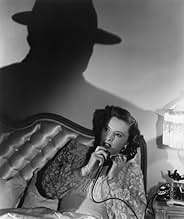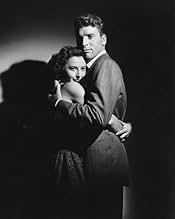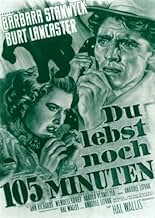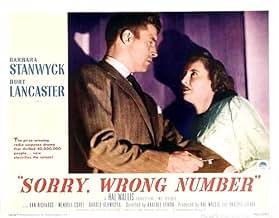IMDb-BEWERTUNG
7,3/10
13.522
IHRE BEWERTUNG
Eine kranke Frau belauscht am Telefon ein vermeintliches Mordkomplott und versucht, es zu verhindern.Eine kranke Frau belauscht am Telefon ein vermeintliches Mordkomplott und versucht, es zu verhindern.Eine kranke Frau belauscht am Telefon ein vermeintliches Mordkomplott und versucht, es zu verhindern.
- Für 1 Oscar nominiert
- 3 Gewinne & 3 Nominierungen insgesamt
Bill Cartledge
- Page Boy
- (Nicht genannt)
Cliff Clark
- Police Sergeant Duffy
- (Nicht genannt)
Joyce Compton
- Cotterell's Blonde Girlfriend
- (Nicht genannt)
Ashley Cowan
- Clam Digger
- (Nicht genannt)
Yola d'Avril
- French Maid
- (Nicht genannt)
Suzanne Dalbert
- Cigarette Girl
- (Nicht genannt)
Empfohlene Bewertungen
Alfred Hitchcock himself praised this movie that was for him one of Barbara Stanwyck's most extraordinary parts.Besides,he did include Lucille Fletcher's short novel in his anthology "stories not for the nervous"(sic)
The story of this woman in her bed,who has heard on the phone someone is in danger,and who little by little discovers the horrible truth,is a first-class screen play which requires the viewer's attention,,or else he may lose the vital lead.The first people who enjoyed it had no pictures,since it was originally a radio broadcast,so they had to show a lot of imagination.The movie remains talky but the numerous flashbacks give it substance.The phone,is along with Stanwyck ,the star of Litvak's work;Burt Lancaster,a great actor though,only serves as a foil to both of them.50% of the dialogue consists of phone calls,that's what makes this thriller unique.
A strong connection with Hitchcock's work is the father's part(Ed Bigley).He is some equivalent of the Mother in many movies of his.The stuffed animals in his desirable mansion are a symbol of his daughter's lifelessness.(Coincidence?There will be such hunting trophies (and more) in his "psycho" twelve years later,and the topic is present in "the man who knew too much"(2nd version))
If you are fond of suspense,this is an unqualified must!
The story of this woman in her bed,who has heard on the phone someone is in danger,and who little by little discovers the horrible truth,is a first-class screen play which requires the viewer's attention,,or else he may lose the vital lead.The first people who enjoyed it had no pictures,since it was originally a radio broadcast,so they had to show a lot of imagination.The movie remains talky but the numerous flashbacks give it substance.The phone,is along with Stanwyck ,the star of Litvak's work;Burt Lancaster,a great actor though,only serves as a foil to both of them.50% of the dialogue consists of phone calls,that's what makes this thriller unique.
A strong connection with Hitchcock's work is the father's part(Ed Bigley).He is some equivalent of the Mother in many movies of his.The stuffed animals in his desirable mansion are a symbol of his daughter's lifelessness.(Coincidence?There will be such hunting trophies (and more) in his "psycho" twelve years later,and the topic is present in "the man who knew too much"(2nd version))
If you are fond of suspense,this is an unqualified must!
Sorry, Wrong Number (1948)
You can tell this thriller was once a radio play--it is mostly talk, and often over the telephone. But what drama can be built on a string of conversations around the office, in cars in the rain, out on a lonely beach on Staten Island, and on the telephone, often filled with mystery and doom.\
Not that it's not a visual movie, either. There is a big gloomy house, and lots of dark city streets. Shadows and moving camera and close-ups of faces and telephones, all keep you glued and increasingly worried. By the end, the really jarring, memorable end, you are ready for what you can never be ready for.
Beware, the plot is confusing. Even seeing it twice I had to pay attention to who was who, and what turn of events had just taken place. Part of the reason is there is a bewildering use of flashbacks, even flashbacks within flashbacks, told by all kinds of different characters. The plot is laid out methodically, but take notes as you go, or at least take note. The initial overheard phone call is key to it all, and it gets reinforced later somewhat, but pay heed there.
And the person on the phone? A sharp, bitter, convincing Barbara Stanwyck, who really knows how to be steely and vulnerable at the same time. Burt Lancaster is more solid and stolid, and maybe less persuasive overall, but he carries a more practical part of the story. It keeps coming back to Stanwyck in bed, and the telephone which is her contact with the facts, as they swirl and finally descend.
Director Anatole Litvak has some less known but thrilling dark dramas to look for, including Snake Pit. But this is his most sensational winner, partly for Stanwyck, and partly for the last five minutes, which is as good as drama gets.
You can tell this thriller was once a radio play--it is mostly talk, and often over the telephone. But what drama can be built on a string of conversations around the office, in cars in the rain, out on a lonely beach on Staten Island, and on the telephone, often filled with mystery and doom.\
Not that it's not a visual movie, either. There is a big gloomy house, and lots of dark city streets. Shadows and moving camera and close-ups of faces and telephones, all keep you glued and increasingly worried. By the end, the really jarring, memorable end, you are ready for what you can never be ready for.
Beware, the plot is confusing. Even seeing it twice I had to pay attention to who was who, and what turn of events had just taken place. Part of the reason is there is a bewildering use of flashbacks, even flashbacks within flashbacks, told by all kinds of different characters. The plot is laid out methodically, but take notes as you go, or at least take note. The initial overheard phone call is key to it all, and it gets reinforced later somewhat, but pay heed there.
And the person on the phone? A sharp, bitter, convincing Barbara Stanwyck, who really knows how to be steely and vulnerable at the same time. Burt Lancaster is more solid and stolid, and maybe less persuasive overall, but he carries a more practical part of the story. It keeps coming back to Stanwyck in bed, and the telephone which is her contact with the facts, as they swirl and finally descend.
Director Anatole Litvak has some less known but thrilling dark dramas to look for, including Snake Pit. But this is his most sensational winner, partly for Stanwyck, and partly for the last five minutes, which is as good as drama gets.
Heck of a thriller, though the narrative is difficult to piece together at times. Stanwyck gets to run through a gamut of hysterical emotions as the intended victim. Her Leona is not particularly likable as the rich man's daughter who gets her way by bullying people around her. So there's some rough justice in her predicament—alone, disabled and dependent on the phone while a killer seemingly stalks her. Even the independent working-man, a studly Henry (Lancaster), is bullied into taking up with her. Of course, it doesn't hurt that she's got scads of money to assist her schemes. Incidentally, catch how Henry's several capitulations to others (Leona, Morano) are marked by allowing them to light his cigarette. Nice touch.
The idea of only gradually revealing why Leona is being set up for murder is a good one. It adds to the suspense—not just a 'when' but also a 'why'. The trouble is the disclosure is only revealed in pieces over the phone using flashbacks, and these are hard to piece together over a stretch of time. But enough comes through that we get the idea. There's some great noir photography from Sol Polito that really adds to the tense atmosphere. Anyhow, it's a great premise that also played well over the radio that I recall as a kid. It's also a subtle irony that one could end up being so alone in the middle of a great city. Poor Leona, maybe if she had been a little nicer and less bossy over the phone, she might have made the human connection she needed.
The idea of only gradually revealing why Leona is being set up for murder is a good one. It adds to the suspense—not just a 'when' but also a 'why'. The trouble is the disclosure is only revealed in pieces over the phone using flashbacks, and these are hard to piece together over a stretch of time. But enough comes through that we get the idea. There's some great noir photography from Sol Polito that really adds to the tense atmosphere. Anyhow, it's a great premise that also played well over the radio that I recall as a kid. It's also a subtle irony that one could end up being so alone in the middle of a great city. Poor Leona, maybe if she had been a little nicer and less bossy over the phone, she might have made the human connection she needed.
Barbara Stanwyck is marvellous! Although she's a rather unlikeable character, she thoroughly captivates your emotions. She drags you completely into her nightmare - you can't look away and like a real nightmare, the sense of not being in control is chillingly real.
Apart from the flashbacks, which epitomise the film noir tropes of the late forties, this film is Barbara Stanwyck alone and scared and trapped in her trappings of wealth. She's confined in the physical and mental luxury jail cell she's made for herself. It's an exceptional performance of a woman in despair driven to the edge, of knowing something awful is about to happen but not being able to do anything about it. It's a perfect example of how a film can stretch out tension and suspense tighter and more intense with each passing minute.
And I also loved it when in one of the flashbacks, Fred shouts to his wife: Hey Sally, Joe wants a bottle of beer and she obligingly dashes out to the shop: oh how 1940s!
Apart from the flashbacks, which epitomise the film noir tropes of the late forties, this film is Barbara Stanwyck alone and scared and trapped in her trappings of wealth. She's confined in the physical and mental luxury jail cell she's made for herself. It's an exceptional performance of a woman in despair driven to the edge, of knowing something awful is about to happen but not being able to do anything about it. It's a perfect example of how a film can stretch out tension and suspense tighter and more intense with each passing minute.
And I also loved it when in one of the flashbacks, Fred shouts to his wife: Hey Sally, Joe wants a bottle of beer and she obligingly dashes out to the shop: oh how 1940s!
Sorry, but 'Sorry, Wrong Number' loses a lot in its transition to the screen. For one thing, there are too many flabby flashbacks--a form quite popular in the '40s but used extensively in this film, ad nauseum. All of the suspenseful action in the bedroom of the bedridden victim is held at bay while we watch another endless flashback attempting to show us how selfish and unworthy this woman is. If you heard the original radio drama with Agnes Moorehead giving a spine-chilling portrait of Leona, you'll see why the film becomes too diffuse in an attempt to give us "filler material". The fact that Lucille Fletcher adapted her own work for the screen would give the viewer hope that this is going to be just as good as the radio drama--but it's not. Barbara Stanwyck gives an excellent performance, bordering on hysteria toward the finale--but it's an actressy performance and not as controlled as some of her other film noir roles. Burt Lancaster has a colorless role and can't do much with it. Ann Richards is impressive as the woman who tries to warn Leona. By expanding the plot outside the bedroom, Fletcher created a confusing number of sub-plots that simply take away from the tension. Too much padding actually hurts the film. Anatole Litvak's direction is strong--but not strong enough to put the film on the same level with the classic radio drama. The plot is overcomplicated to the nth degree.
Trivia note: The only other film with such heavy use of flashbacks to tell a complicated story is THE LOCKET ('47), but it was done more efficiently than it is here.
Trivia note: The only other film with such heavy use of flashbacks to tell a complicated story is THE LOCKET ('47), but it was done more efficiently than it is here.
Wusstest du schon
- WissenswertesAnatole Litvak: When Henry is having lunch with Sally, he asks the waiter if he knows who the gentleman is in the dark glasses at the table behind him. It's the director of the film.
- PatzerTwice, Leona turns on a radio, and music begins instantly and strongly. Radios of the film's era contained vacuum tubes that needed some time to warm up.
However, this would be filmmaker's prerogative, not wanting to slow the pace of the film with extended silence.
- Zitate
Henry Stevenson: [to Leona] I want you to do something. I want you to get yourself out of the bed, and get over to the window and scream as loud as you can. Otherwise you only have another three minutes to live.
- Crazy CreditsPROLOGUE: "In the tangled networks of a great city, the telephone is the unseen link between a million lives...It is the servant of our common needs-the confidante of our inmost secrets...life and happiness wait upon its ring...and horror...and loneliness...and...death!!!"
- VerbindungenEdited into Tote tragen keine Karos (1982)
Top-Auswahl
Melde dich zum Bewerten an und greife auf die Watchlist für personalisierte Empfehlungen zu.
- How long is Sorry, Wrong Number?Powered by Alexa
Details
- Erscheinungsdatum
- Herkunftsland
- Sprache
- Auch bekannt als
- Al filo de la noche
- Drehorte
- Hollywood, Kalifornien, USA(telephone switchboard at a telephone company office on Gower St.)
- Produktionsfirma
- Weitere beteiligte Unternehmen bei IMDbPro anzeigen
Box Office
- Weltweiter Bruttoertrag
- 1.974 $
- Laufzeit
- 1 Std. 29 Min.(89 min)
- Farbe
- Seitenverhältnis
- 1.37 : 1
Zu dieser Seite beitragen
Bearbeitung vorschlagen oder fehlenden Inhalt hinzufügen




































